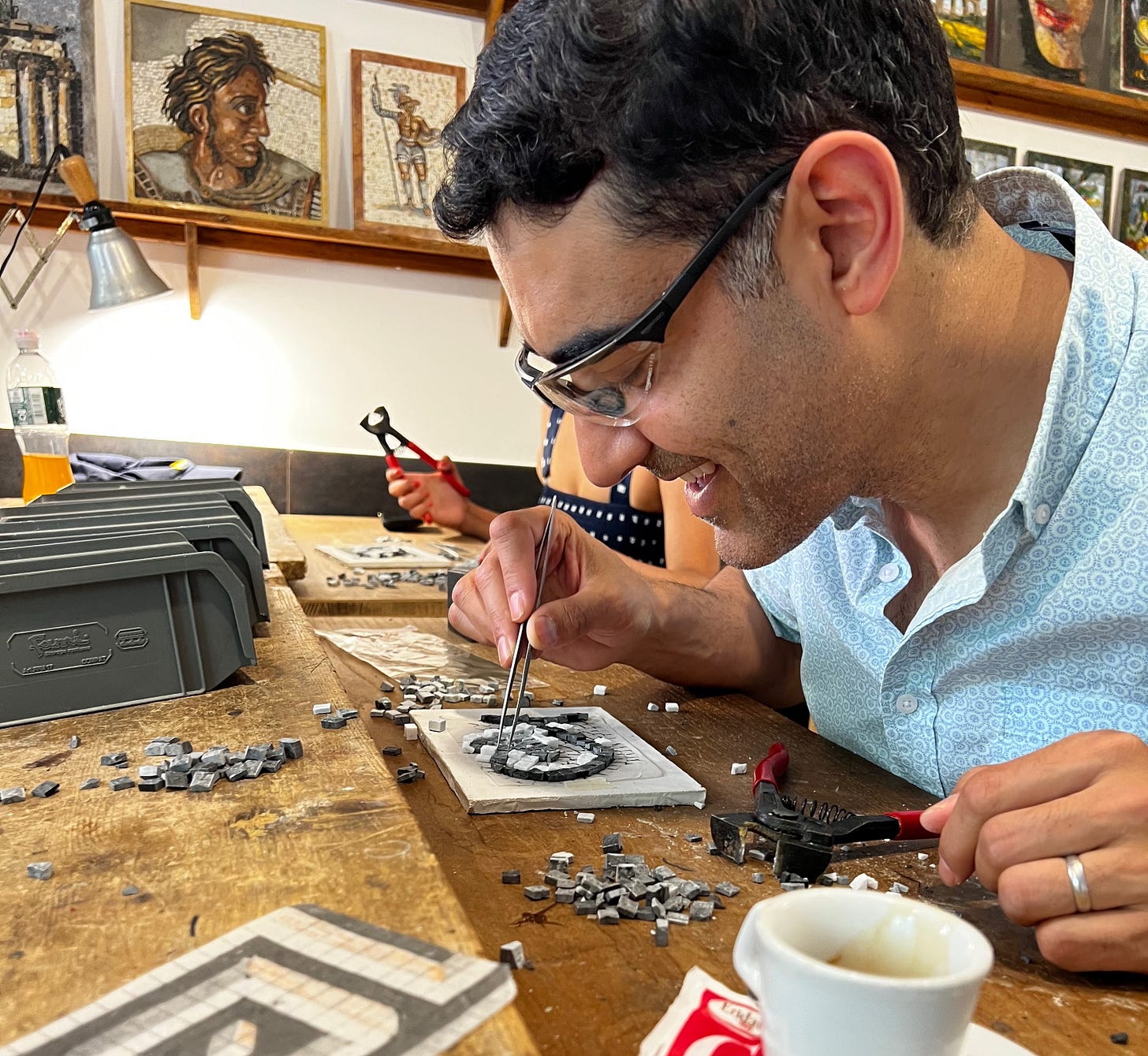When I travel, I like to immerse myself in the culture. Last summer, my family and I visited Rome for the first time, and instead of just admiring the incredible art and architecture, we wanted to experience it firsthand. So, we signed up for a class in Roman mosaics.
Each of us picked a pattern from the instructor’s pile, and I got to work—extra motivated to make mine even better than my wife’s and two boys’. But instead of impressing the instructor, I got a brutal reality check. She was direct, no sugarcoating—mine was completely wrong. I had decided to gradate the pattern from light to dark, thinking I was adding a creative twist. She was not having it.
But I wasn’t there to win. I was there to learn. So, I took the feedback, set my ego aside, and embraced the rejection. After all, mastering a new skill requires humility. That experience stuck with me—not just because my mosaic was a disaster, but because it was a reminder that learning anything new requires a willingness to be wrong. You can’t improve if you refuse to take feedback. And as it turns out, that lesson applies just as much to entrepreneurship as it does to Roman mosaics.
Recently I had a chance to chat with ABC’s Shark and NYC’s Real Estate Queen, Barbara Corcoran. Almost unprompted, I asked her about entrepreneurs, and she said with utmost confidence that the key trait of a successful entrepreneur is being able to manage rejection.
“To hear 10 no’s and wait for the yes.”
The idea that entrepreneurs need resilience to overcome obstacles, rejection, and impossible odds is a common refrain in startup lore. I recently came across a clip of Elon Musk sitting next to a pile of debris from a failed SpaceX rocket launch, a visual reminder that innovation often comes through failure. And of course, Thomas Edison famously said that it took him 10,000 errors to get one success. At the same time, we also know that Elizabeth Holmes, convicted felon and former CEO of Theranos, once echoed a similar sentiment: “At first, they don’t believe you.”
So the question is, can entrepreneurs conjure an imagined world, a vision for the future, dream big—without being arrogant or, worse, deceptive? I think about this balance every time I introduce students to the Founder Challenge at NYU.
The Founder Challenge: A Different Kind of Confidence
Frustrated with the pace of new venture creation at NYU, I spoke the idea of the Founder challenge into life during a class session. I challenged the students to:
Become a founder.
In three months.
Be modest.
The first two parts push students to take action—quickly. Instead of waiting for the perfect idea, we ask them to adopt the identity of a founder, pick a problem, and put forward an imagined solution. Action and speed help them overcome inertia and analysis paralysis.
But the third part—be modest—is just as critical. The best founders don’t pretend to have all the answers. Instead of stubbornly defending their first idea, they treat it as a hypothesis. They go out, gather evidence, and let reality shape their thinking. The ones who succeed lead with curiosity, not ego—they’re not trying to prove they’re right; they’re searching for where they’re wrong.
This mindset isn’t just theoretical—it’s exactly how some of today’s most successful entrepreneurs built their companies.
Move Fast, Stay Humble
Some of the best founders know that confidence isn’t about blind conviction—it’s about taking action while staying open to learning. Whitney Wolfe Herd, when launching Bumble, didn’t wait for a perfect plan. She moved fast, bringing her vision of a dating app where women make the first move to life within months. But she didn’t assume she had it all figured out. Instead, she listened—adapting the platform based on how people actually used it, expanding into friendships and professional networking. Brian Chesky, co-founder of Airbnb, took a similar approach. Instead of insisting that people would rent out their homes to strangers, he and his co-founders tested the idea directly, knocking on doors in New York, talking to potential hosts, and tweaking their model based on real feedback. Both founders had bold visions, but neither relied on arrogance or empty claims. They let action—not ego—prove their ideas.
Confidence without Arrogance
This is the difference between vision and deception. The best entrepreneurs don’t just believe in an idea—they test it, refine it, and stay open to where they might be wrong.
That’s the kind of confidence that builds real, lasting ventures. Not blind faith, not arrogance—just the willingness to take bold steps while staying humble enough to keep learning.
Thanks for reading! Subscribe for free to receive new posts and support my work.






